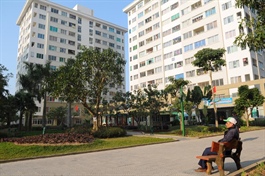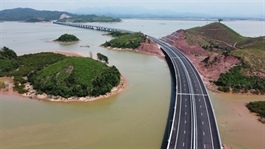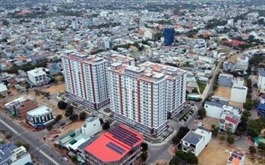Vibrant activity felt with real estate M&A
Vibrant activity felt with real estate M&A
Merger and acquisition activities in the first months of the year surged with several huge deals, signalling the Vietnamese market is ready to welcome foreign investors into projects thirsty for capital.
On March 20, it was revealed that CapitaLand Group was in talks to acquire assets worth roughly $1.5 billion from Vietnam’s biggest listed property firm, Vinhomes. If this deal is closed, it would mark one of the largest real estate transactions in Southeast Asia in the last few years.
Ten days before, VinaCapital announced that it has signed an MoU with Ryobi Group to work on suitable real estate projects, venture capital, infrastructure, energy, and other investment opportunities in listed and private equity in Vietnam. One potential project for collaboration is the development of low-rise residential projects in satellite cities surrounding Ho Chi Minh City being undertaken by VinaLiving, the real estate investment arm of VinaCapital.
VinaLiving chairman of the Board of Directors Do Chi Hieu emphasised that foreign real estate developers like theirs are focusing on niche market segments.
“The mass market is still in the hands of Vietnamese investors because of their outstanding capacity in land development, project implementation, and sales. The participation of foreign investors will add options for homebuyers, and at the same time encourage competition through product quality,” Hieu said.
“The most important thing is diversification of capital sources for project implementation. Therefore, in the long term, I think it will bring positive effects to the market.”
Commenting on the current market, Hieu said that Vietnamese real estate was attracting significant attention from foreign investors with long-term capital.
“During the bull-run growth cycle, which was the longest in Vietnam’s real estate market from 2016 to 2022, very few foreign investors could participate in the growth created by new land. The fact that Vietnamese investors are willing to restructure their portfolios and accept to sell some high-quality assets opens up great opportunities for foreign investors,” Hieu added.
Meanwhile, Can Van Luc, a member of the National Monetary and Financial Policy Advisory Council, said that capital flows from mergers and acquisitions (M&As) were critical for the real estate market, as many businesses recommend the banking system to lend to finance the shortfall in M&A transactions.
“I recommend that businesses should be allowed to borrow loans from banks because this is completely feasible and is a real need. Enterprises should have 70 per cent in their pocket, while the rest should be financed by banks,” Luc said at an investment seminar in the northeastern province of Quang Ninh in late March.
Deals on the rise
Nguyen Minh Ha, a real estate broker from Star Real Estate Agency in Ho Chi Minh City, said that the difficult and capital-starved real estate market in 2022, and from the beginning of 2023, provided a good opportunity for M&A deals.
“However, it should also be noted that successful deals only happen to financially transparent businesses and legal real estate projects. This is a high time of intense negotiations. If the revised draft Law on Land is officially approved in October, M&A transactions will explode more strongly and large-scale successful deals could come as early as 2024,” Ha said.
In the first quarter of 2023, the market recorded good signs in M&A in the real estate sector, including a slew of mega deals.
Khang Dien Group and Keppel Land Vietnam signed an MoU marking the cooperation in developing residential projects and sustainable urban areas in Ho Chi Minh City in February.
Malaysian giant Gamuda Land completed two major deals in 2022 – acquiring the entire Uni Galaxy project in the southern province of Binh Duong from Becamex ITC, and merging a domestic company to own the Elysian, a residential project in Ho Chi Minh City.
At the beginning of the year, Nam Long Investment completed the procedure of transferring 25 per cent of the charter capital of Paragon Dai Phuoc. The company was established in 2018 with the purpose of investing and developing the Nam Long Dai Phuoc urban area.
A few days later, Vina Dai Phuoc, the investor of the SwanBay Dai Phuoc project located near Nam Long Dai Phuoc, also announced a changing in charter capital. From the foreign capital structure accounting for nearly 73 per cent previously, Vina Dai Phuoc will become 100 per cent owned by domestic enterprises.
At the end of February, Phat Dat Real Estate Development also approved the decision to buy 99 per cent capital of $8.6 million at Bac Cuong Investment. After this buyout, Phat Dat has the entire right to develop more than 2,700 sq.m in Tran Phu street of the central city of Danang.
Data from commercial real estate research firm Real Capital Analytics shows that there have been five industrial real estate M&A transactions in Dong Nai, Bac Giang, Bac Ninh, Vinh Phuc provinces, and two land development projects in Ho Chi Minh City and the Central Highlands province of Gia Lai, with the total value of announced transactions estimated at more than $100 million.
New investors looking to enter the market are returning. According to Bui Trang, country head of Cushman & Wakefield Vietnam, in the context of the unstable global economy with the collapse of some major banks, the Vietnamese market is more attractive than many others.
“Usually, when other markets have political and economic fluctuations, real estate investors flock to Vietnam as a safe place,” Trang said.
Trang added that from now to 2025, the market could expect larger deals, especially private placement deals to choose strategic partners of large equitised state-owned enterprises, of state-owned enterprises and foreign investment. In particular, the transfer of real estate projects will continue to be of interest.
Potential to take over
Since October 2022, the real estate market has slowed down, making strategic investors more cautious. But foreign investors who have a long history and rich portfolio in investing in Vietnam are still very persistent with their strategy by continuing to buy properties or partnering with trusted local real estate developers.
The majority of closed and closed transactions come from investors who are knowledgeable about risk fluctuations and market demand, with the aim of finding a rate of return and expanding their portfolio in the region.
In the housing development segment, the decline of many domestic real estate businesses led to a series of frozen projects. This has opened up opportunities for businesses with the financial potential to take over. In particular, local developers who actively mobilise capital through corporate bonds have encountered many difficulties in recent years due to the impact of credit tightening.
Therefore, the trend of selling bad debt assets from domestic real estate companies or looking for capital partners is increasing.
After periods of fever growth, along with some difficulties in capital for many investors, the demand for project transfer will continue to be strong in the next few years.
Many project sales and transfer deals are in the negotiation stage. Another factor that is making the real estate M&A market in 2023 prosper is that the projects offered for sale have more complete legality and the seller’s psychology is easier to negotiate than before.
According to Cushman & Wakefield, the total transaction volume of officially announced real estate M&A deals in 2022 reached more than $1.7 billion. This is the highest transaction value in the past five years, mainly focusing on the office, industrial, residential and hotel segments in key cities and areas such as Ho Chi Minh City, Hanoi, Binh Duong, and Dong Nai.
“It is recommended that investors carry out thorough due diligence at both project and company levels in all aspects of legal, financial, and tax matters before determining the acceptance of the transaction structure and the conclusion of a binding sales contract,” Trang said.
In fact, there are quite a few real estate businesses in Vietnam that are not transparent about their finances, especially, without an independent audit unit. This hinders foreign investors from deciding to participate in projects.
Acquiring a long-delayed real estate project and refreshing it is a strategy that has helped many businesses achieve breakthrough growth. The speed of project revival depends on many factors, but one thing in common in most M&A deals in the past is that the completion of the project was immediately pushed forward after being acquired, Trang added.





















